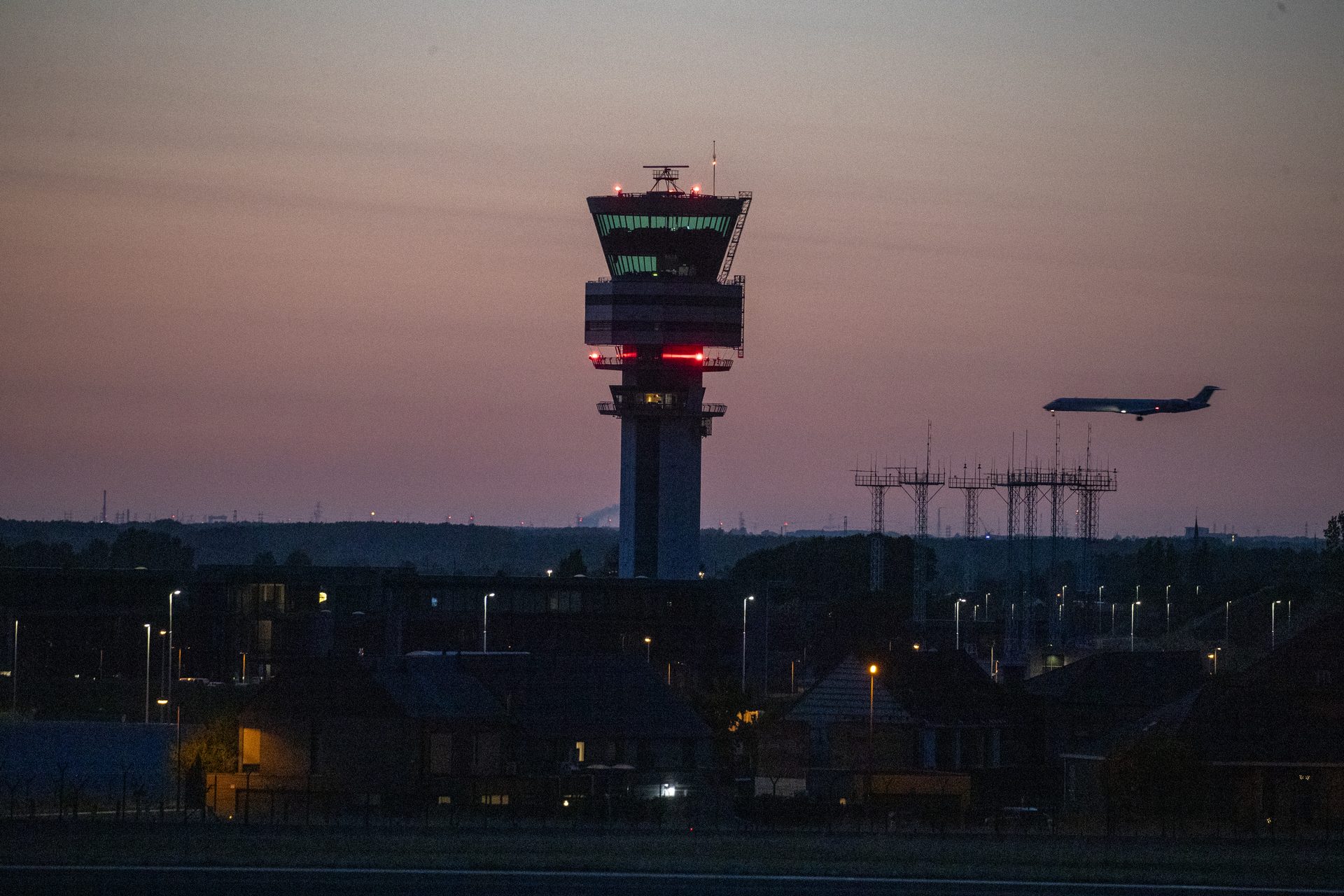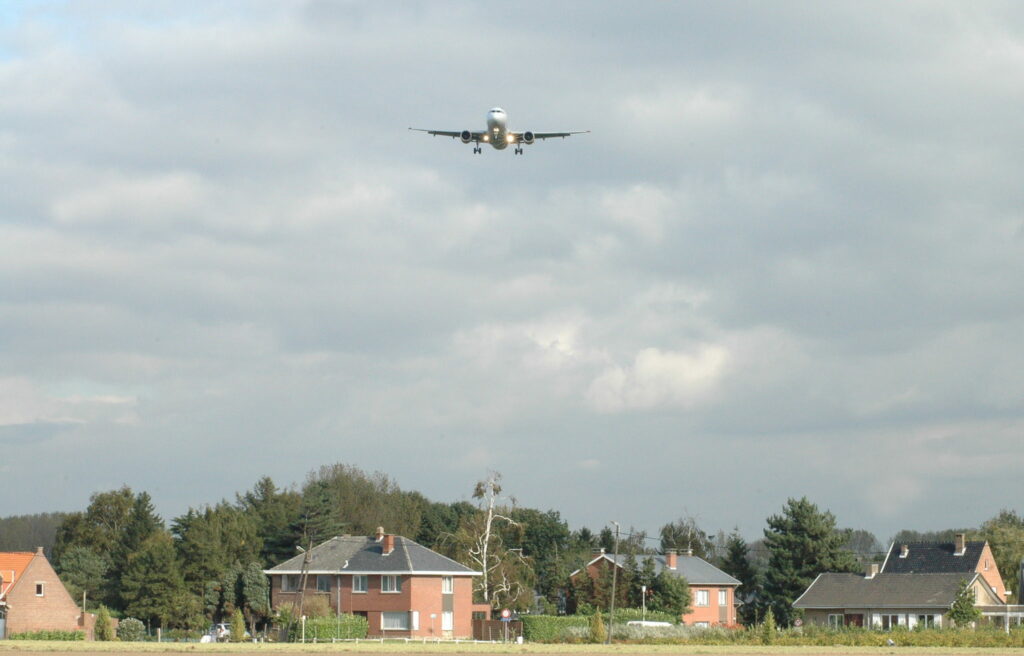The Superior Health Council (HGR) is calling for extended bans on night flights at Brussels Airport after additional analysis found tens of thousands of people living in the vicinity are at increased risk of negative health effects.
In a report published on Tuesday, the HGR confirmed that almost 164,000 people living around Brussels Airport are subject to noise levels that far exceed the World Health Organisation (WHO) standards of 45 dB(A).
"Here, the most important factor is not the average noise level overnight, but the amount of times loud aircraft movements are recorded," said Jean-Louis Migeot of the ULB. "People in the larger vicinity of the airport observed loud passing of planes 10 times per night, often being brutally awakened and struggling to fall asleep again."
Of the almost 235,000 aircraft movements in 2019, more than 17,000 took place between 23:00 and 06:00. Based on these figures, a total ban on night flights between 23:00 and 06:00 was put forward (and heavily criticised). However, researchers involved in the HGR report stressed that these figures underestimate the actual burden of air traffic at night, as an additional 10,000 flights take place between 06:00 and 07:00 in the morning.
Aircraft noise above the WHO limits is associated with adverse health effects. Overhead flights and disturbed sleep have a direct correlation, linked to delayed cognitive development in children, hypertension and cardiovascular disease. A direct link was also made between overhead flights and self-reported severe annoyance, considered an early warning of adverse health effects associated with an increased risk of depression and anxiety.
The Council is therefore calling for a ban on night flights between 23:00 and 07:00, one hour longer than the previously proposed ban to combat this sleep disruption.
Political scope for strict measures?
Federal Minister for Mobility Georges Gilkinet (Ecolo), who requested a study on the health impact of Brussels Airport on local residents, argued that the conclusions are crystal clear. "Noise pollution caused by aviation has a very negative impact on the health of people living nearby, which is all the more pronounced at certain times of the day," he said in a statement to The Brussels Times.
Studies have highlighted the positive impact night flight bans could have on people's health and the cost this would save as well as disputing the supposed loss of jobs. Still, a complete ban on night flights was not included in the new environmental permit for airport operator Brussels Airport Company which Flemish Environment Minister Zuhal Demir (N-VA) approved at the end of March.
The HGR recognised the political difficulty of the matter. "Due to the specific location of Brussels Airport close to the border of several regions and communities, adequately dealing with and sharing the burden of aircraft noise has been a complex political issue for decades."

An aircraft flying past the control tower as it lands at Brussels Airport. Credit: Belga/ Nicolas Maeterlinck
However, in response to the HGR's report, Federal Health Minister Frank Vandenbroucke (Vooruit) once again called for a "gradual, realistic but systematic phase-out of night flights", with flights with the noisiest aircraft being stopped first.
Brussels Environment Minister Alain Maron (Ecolo), who is leading the Brussels Government's appeal against the permit, responded that this report illustrates the importance of finding a better balance between the environment, quality of life and health of the people of Brussels, on the one hand, and the economic interests of the aviation industry, on the other.
"The new environmental permit granted to Brussels airport is unbalanced and ignores health and environmental concerns, even though these impacts have never been so well documented." Gilkinet added that progress is still possible and that the various levels of government must take the necessary steps now. "Brussels must not become the noise bin of Europe. I call on all stakeholders to follow the path I have proposed as soon as possible, in the general interest of all residents and their health."
Meanwhile, Brussels Airport has responded to the report stating night flights are already severely limited. It stressed the night slots it still has are necessary for cargo operations, but also for the airport's passenger network.
A spokesperson added that the airport's noise impact already decreased by 57% between 2000 and 2019. "The environmental impact report, as part of the new licence, shows that the number of people with self-reported severe annoyance will decrease further by 12% in the coming years" through innovative landing techniques and a more modern fleet.
Over-arching indicators and halting urbanisation
The researchers also took a closer look at the pollution caused by flights around Brussels Airport. Exposure to ultrafine dust around the runways was found to be too high, especially to the northeast in Steenokkerzeel and Kampenhout.
"Several studies show that in the short term, ultrafine dust emissions, characteristic of aircraft lead to reduced lung function and changes in heart rhythm," said Greet Schoeters, an environmental health expert at UAntwerpen. "In the long term, this can also be linked to more cardiovascular diseases and lower birth weight."
The HGR also wants to see the concentration of flights in the early morning and evening scaled back and to prevent a further increase in frequency. The Brussels Region wants the number of aircraft movements to be limited to 220,000 per year.
The Council also called on governments to stop further urbanisation of the region. "These are very sensitive areas, and new houses should not be built there."
Finally, it urged for more studies to better identify the effects on health in Brussels and the surrounding area using more in-depth medical data, but stressed that this should not be used as an excuse not to take action now. "Sufficient data highlights the gravity of the situation."
Maron supports the proposal for further studies in the region. Brussels Environment, based on WHO indicators already assessed the health impact of noise pollution, including caused by overhead flights. "In 2021, road, air and rail noise has resulted in the loss of more than 400 healthy life years, 32% of which is due to aeroplane noise alone."

